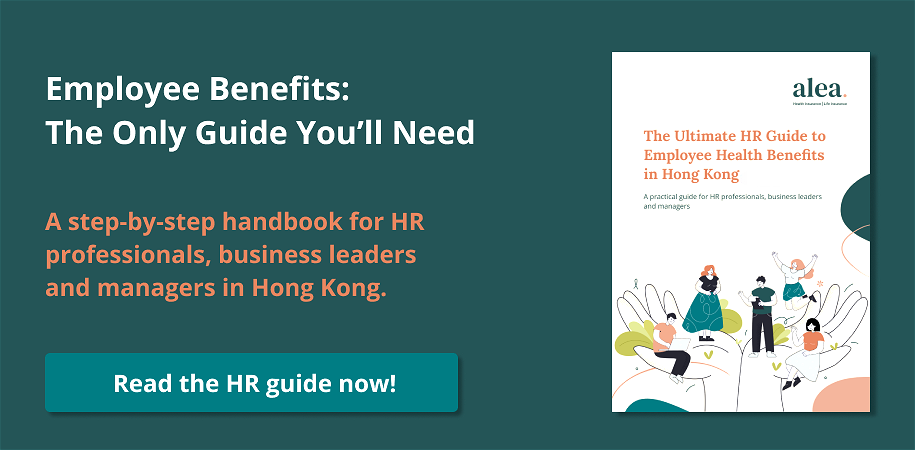



(2026) Group Medical Insurance in Hong Kong: Startups, SMEs & MNCs
5th February 2026



About Alea
Alea is a leading Hong Kong headquartered health insurance broker with years of experience navigating the complex insurance market. We help you save time and money by offering you choice of 100+ options from 25+ insurance companies. Our trusted advisors are ready to answer any questions you may have!
We have extensive experience in finding the right group medical insurance for companies in Hong Kong, from startups, SMEs to larger corporations, from various industries from fintech, law firms to asset management companies.

From startups to small and medium-sized enterprises (SMEs) to large corporations, providing health insurance to employees makes a huge difference and is an important attraction and retention tool. In Hong Kong, medical benefits are by far the number one benefit employees are most interested in. This is partly because Hong Kong has the second most expensive private health system in the world [1] after the United States.
At Alea, we educate and advise companies every day about their health insurance options. Often we receive the same questions from clients, so let us share some of the most common ones.
If you are in HR or manage a business and wonder what your options are, here is a practical guide with tips to choose the right group medical plan] for your budget and needs. Alternatively, if you are looking through your options to renew your group medical plan, you may check out our exclusive guide here.
1 - What’s the difference between Medical Insurance and Employee Compensation Insurance?
Unlike Employee Compensation Insurance (EC), health insurance is not legally mandatory in Hong Kong. It is fully up to the employer to decide whether the company will provide medical insurance to its employees and their dependents.
EC is legally required and inexpensive:
Employee compensation insurance [2] covers every employee regardless of their length of services, working hours (full-time or part-time job) and place of employment. This insurance cover is for occupational disease, death in the course of employment and work injuries. If a company fails to comply, the employer can be penalized with a maximum fine of HK$ 100,000 and 2 years of imprisonment. To know more about employee compensation insurance, please click here.
Group Medical Insurance is not legally required but is a key benefit to attract & keep staff:
Employee medical benefits cover the health of your employees for conditions that are not work-related. While there is no legal obligation to provide employee medical benefits, it is by far the number one benefit employees are interested in. Hong Kong has the second most expensive private health system in the world after the United States. Moreover, in Hong Kong staff turnover is generally quite high. This is why all large companies provide medical cover to their staff and startups/SMEs use these benefits to keep their staff and compete for the best candidates.
2 - Medical insurance for Startups/SMEs and large companies: What’s the standard practice in Hong Kong?
The vast majority of large companies, competitive startups and SMEs i.e. those looking to attract and retain employees, do provide medical coverage to their staff and dependents. That being said, the level and extent of coverage vary greatly and are often tiered according to staff levels within the company. In other words, the higher you are in the hierarchy, the better medical benefits you may have.
a) Standard benefits
In Hong Kong, most employee medical schemes provide the following categories of protection:
- Hospital / Inpatient
- Outpatient
- Dental
- Worldwide evacuation
Some of the additional benefits employers provide are:
- Annual physical exam (body check)
- Maternity coverage
b) Standard sub-limits
In Hong Kong, there is a wide range of medical benefits you can choose from and in the end, it all boils down to costs and quality. Beware that with basic employee medical benefits, there are many sub-limits per category of care that can easily be exceeded in Hong Kong’s private health sector. With such sub-limits, your employee will often have to pay out-of-pocket, use any top-up medical plan he/she holds, or seek services in the public sector where HA charges and fees are much lower.
With comprehensive employee medical benefits, premiums are much higher but your employees are generally fully covered when seeking services in the private health sector (no sub-limits).
c) Standard room levels
One of the unique characteristics of the Hong Kong private medical system is that doctors’ fees are correlated to the hospital room type. In other words, the more expensive the room, the more expensive all the other fees.
This is why you can choose employee medical benefits that are specific for private, semi-private or ward-level rooms. The less expensive the room level, the less expensive the insurance premiums. In the past years, the Alea team has witnessed a preference for semi-private room cover for basic employee cover and private room for comprehensive employee benefits.
3 - Who is covered under work medical insurance?
While some companies choose to cover employees only, others also cover dependents (spouse and children). Note that grandparents/parents cannot qualify as dependents. Whether you choose to cover dependents or not is a matter of cost and HR policy. Does the couple have to be married for the spouse to qualify as a dependent? It is determined by internal company policy. Your insurance provider will not ask for proof of marriage.
How Alea helps you save money on insurance
4 - Startups & small businesses: Can I get a group medical plan for 1 or 2 employee(s) only?
Very few insurance providers accept starting group plans with only 1 or 2 employee(s). In fact, the standard minimum to start a medical plan in Hong Kong ranges between 3 to 5 employees.
When starting small, you can either get an individual plan per employee or look into your options for micro-enterprises. We at Alea work with some insurance providers that can start group medical plans as of 1 or 2 employees only.
While the number of employees is not large enough to get any premium discounts or medical history disregarded (coverage of medical pre-existing conditions), these group medical plans provide greater flexibility than individual policies:
→ You can add/remove employees throughout the policy year and be charged/reimbursed pro-rata.
A micro group plan is therefore more flexible than an individual plan which locks coverage for one year. This is particularly attractive to start-ups which often face financial challenges.
5 - How does the number of employees influence my insurance options?
| 3 to 6 employees | 7 to 10 employees (most common) | More than 10 employees | |
|---|---|---|---|
| Medical history disregarded* | Possible but rare and expensive | Yes | Yes ➔ great margin of negotiation |
| Discount | Possible | Yes | Yes ➔ great margin of negotiation |
*Medical history disregarded: This means that employees won't be discriminated against based on their pre-existing conditions. Employees and dependents are fully covered regardless of their conditions/medical history.
Common practice: Under basic group plans in Hong Kong, the rules around coverage of pre-existing conditions are different and you should seek advice from your insurance advisor.
6 - Can employees keep their medical benefits when they leave the company?
When changing or switching jobs, employees usually automatically lose their medical coverage. Regardless, there are exceptions on the market. Your broker can help you add a portability option to your medical group plan (also known as "guarantee of conversion") through which an employee who leaves your company can elect to convert his/her group cover to individual cover.
Although this is rare, it is hugely attractive for employees, especially in cases of pre-existing conditions. This will save them from undergoing new underwriting with a new insurer and risking total exclusion of their pre-existing conditions under their new plan.
w## 7 - How to find the right group medical plan?
Health insurance is complicated – yes, we heard you, but it doesn’t have to be.
As your health insurance broker, we listen to your needs and find plans that suit your budget by comparing quotes from 25+ insurance companies that we partner with, which include April, Blue Cross, Bupa, Chubb, Cigna, FWD, and many more. We provide around-the-clock support in English, Cantonese, Mandarin and French with unbiased advice to help you save money and time on your group medical insurance, answering any questions you have!
Alternatively, if your company is already insured, we offer a free audit of your current coverage to assess whether your existing policy fulfills your actual needs, and cut down costs for you. Get peace of mind and save money on your insurance, with our expert advice and personalised service.
Get in touch with us today to learn more about your options!
Footnotes:
[1] https://www.healthymatters.com.hk/8-things-you-should-know-about-healthcare-in-hong-kong/
[2] https://www.labour.gov.hk/eng/faq/cap282a_whole.htm
Looking for life or health insurance for yourself, your family or your team?
Do you already have an insurance policy? You could find a better plan!
Alea brings you choice, unbiased advice and outstanding service, with access to 100+ options from 25+ insurance companies. If you already have an insurance policy, switching insurance policies with Alea doesn’t cost you a thing.
Get free quotes with us today.
An advisor will be in touch to answer all your questions!
This article was independently written by Alea and is not sponsored. It is informative only and not intended to be a substitute for professional advice and should never be relied upon for specific advice.
